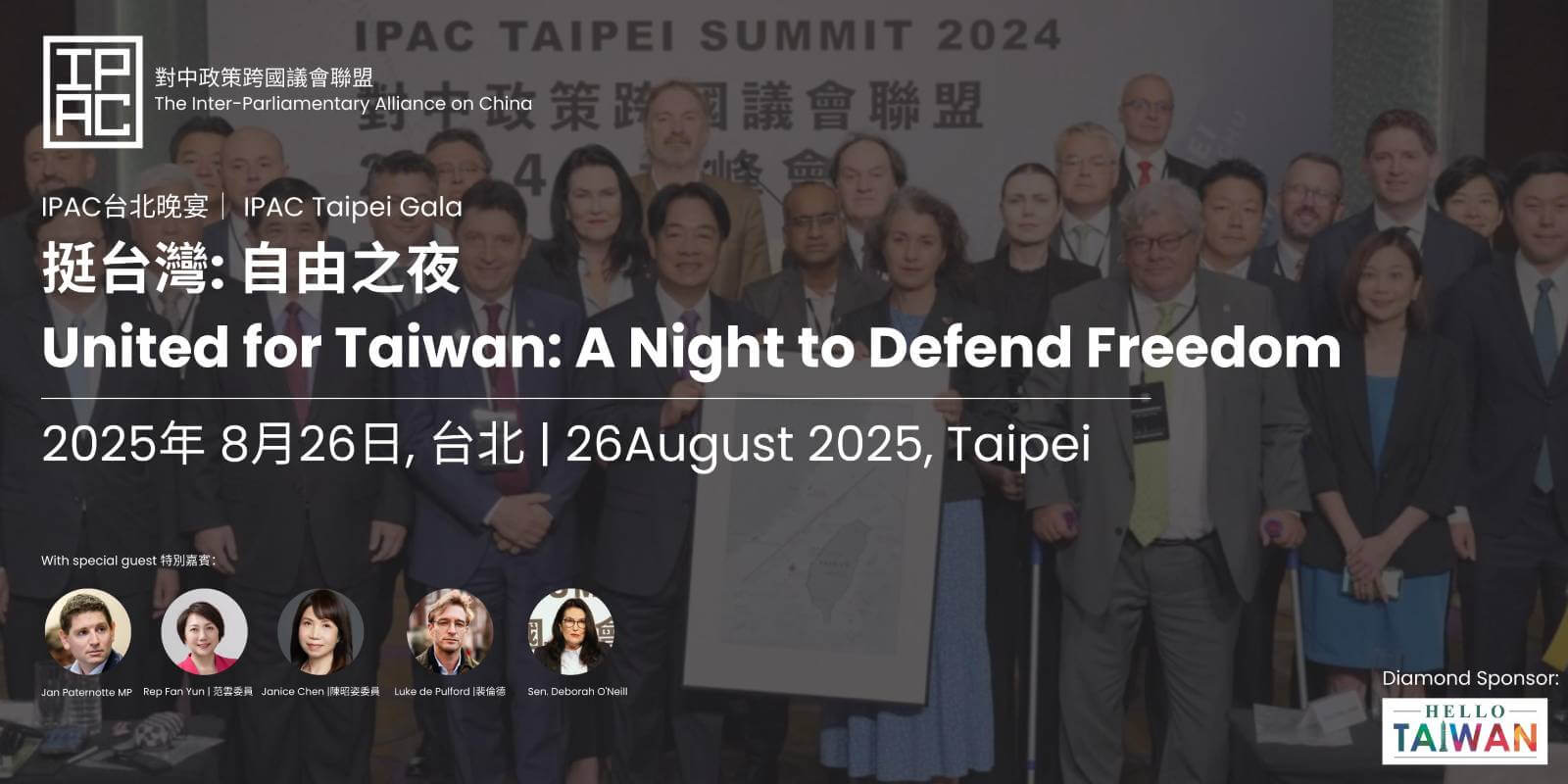IPAC Taipei Summit 2024 - Summit Report

The Inter-Parliamentary Alliance on China (IPAC) Taipei Summit 2024 was held in Taipei, Taiwan, between the 29th and 31st July. Bringing together 49 lawmakers from 24 legislatures across 5 continents, this is the largest delegation of lawmakers to have visited Taiwan.
Delegates were addressed by President Lai Ching-te, Vice-President Hsiao Bi-khim, Deputy Minister of Foreign Affairs, Chung-Kwang Tien, and Secretary-General of the National Security Council and former Minister of Foreign Affairs Joseph Wu Jau-shieh. Delegates also met with senior members of the Legislative Yuan and were briefed by leading international experts.
Day 1 – Hosted by the Taiwan Ministry of Foreign Affairs
The day began with an audience with Vice-President Hsiao Bi-khimn at the Taipei Guest House. She spoke of a "common and shared agenda of ensuring democracy, peace and prosperity,” and of Beijing "aggressively expanding their military presence as well as other grey-zone hybrid tactics of coercion in the Taiwan Strait and toward the people of Taiwan”.
She added: "Your presence here is at a very important moment as we strive to make Taiwan much more resilient in our own self-defence but also resilient in our democracy and resilient in our society and resilient in our economy."
This was followed by lunch with members of the Legislative Yuan, during which a leading Taiwanese think-tank gave a presentation on China’s attempts to interfere in Taiwan’s elections, disinformation campaigns and the increasing cooperation between China and Russia.
In the afternoon, delegates visited Advantech, a specialist semiconductor manufacturer, where they were briefed by company executives on the semiconductor industry and given a tour of Advantech’s Taipei showrooms.
The day ended with a Reception Dinner hosted by Deputy Minister of Foreign Affairs, Chung-Kwang Tien, and attended by members of the diplomatic community.
Day 2 – IPAC Summit and Plenary Session
The day opened with the IPAC Plenary Session, during which lawmakers were each given time to update the network on local concerns, challenges and progress made. This was followed by expert briefings on the role of technology in transnational repression and election interference, and personal cyber security.
At lunch delegates heard from the international legal team of Hong Kong media owner and political prisoner Jimmy Lai, and from Philippine journalist and Nobel Prize laureate Maria Ressa.
The afternoon session on Instability across the Taiwan Strait was addressed by President Lai, who was joined by founding IPAC co-chair Reinhard Bütikofer and world-leading experts. President Lai outlined Taiwan’s Four Pillars of Peace action plan, and called for a “democratic umbrella” to provide safety and mutual resilience to expanding authoritarianism. The experts then briefed delegates on the history and legal status of UN General Assembly Resolution 2758, and on the economic impact of a blockade of the Taiwan Strait, before delegates discussed the issues raised. The session ended with Vice Minister Chen Li-kuo thanking IPAC for its support.
The day concluded with a Press Conference with Vice-President Hsiao, and a dinner reception with Joseph Wu Jau-shieh, Secretary-General of the National Security Council of Taiwan.
Day 3 - Civil Society Brunch hosted by the Friedrich Naumann Foundation
15 local civil society organisations working in areas as diverse as media to civil-defence, engaged with delegates in an informal marketplace setting.
…
At the Summit, IPAC delegates launched the 2758 Initiative, pledging to pass resolutions in their own parliaments to reject Beijing’s distortion of UN General Assembly resolution 2758 and international law regarding Taiwan’s status.
Delegates also agreed to continue pressing democratic governments to recognise the importance of cross-strait stability to global security and their own economies, in line with IPAC’s Operation MIST - a campaign for governments to Measure the Impact of a Shock in the Taiwan Strait. IPAC believes the necessary steps to deter escalation in Cross-Strait tensions will only be made when the global economic fallout of such action is publicly known.
Additionally, IPAC members roundly condemned Beijing’s attempts to interfere in their Annual Summit through intimidation and pressure tactics. This global diplomatic effort to disrupt IPAC’s Summit follows disclosure by the US Department of Justice in 2024 of a 2021 PRC state-sponsored cyber-attack on the IPAC network.
IPAC is grateful for the support of the Taiwan Ministry of Foreign Affairs, without whose support the summit would not have been possible.

%20(1).jpg)




















